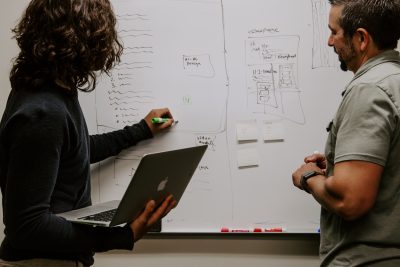Global Competitiveness
The United States has long been the destination for the world’s most talented immigrants. Despite the last 50 years of technological advancement, American immigration policy has remained virtually unchanged, putting in danger America's global competitiveness. Yesterday's immigration policy no longer meets today’s economic needs. Only about 14 percent of all U.S. green cards are given for economic reasons, compared to more than 60 percent in Canada and Australia. With no dedicated visa for entrepreneurs and numerous barriers to residency in place for international students to stay after graduation, America's outdated immigration policy could allow other countries to out-compete us by attracting and keeping the best and brightest there and not here.

Eugenie Kirenga
In 2005, Eugenie Kirenga traveled with her one-year-old son from Rwanda to the United States to visit her two sisters who were attending school in Pittsburgh, PA. But as her return date approached, news broke that Rwandan soldiers, who had left the country during the genocide, were returning to the… Read More

New Report Shows Immigrants in Southwest Kansas Paid Over $192 Million in Taxes and Held More than $595 Million in Spending Power in 2019
DODGE CITY, KS – A new report, New Americans in Southwest Kansas and Ford County, released today by New American Economy—now the American Immigration Council—in partnership with Dodge City and Catholic Charities of Southwest Kansas, underscores the crucial role immigrants… Read More

Lao Refugee Becomes Engaged Community Leader in Minneapolis
Sunny ChanthanouvongExecutive Director of the Lao Assistance Center When Sunny Chanthanouvong arrived in the U.S. with his family as a Lao refugee, little did he know he would soon be among 13,000+ rebuilding their lives in Minnesota, a state as different as one might imagine from Southeast Asia. It… Read More

Indian Researcher Starts Non-profit to Serve South Asian Community in Minneapolis
Raj ChaudharyCEO, SEWA-AIFW When Raj Chaudhary moved to Minneapolis in 1968 to become a cancer researcher at the University of Minnesota, she felt like a pioneer. At that time, the Twin Cities’ Indian community was small. And as it grew, newcomers would frequently tap earlier arrivals like Chaudhary and her husband… Read More

Somalian Refugee Launches Interpretation Company in Minneapolis
Khadija AliCEO, Global Language Connections Former child refugee Khadija Ali is a natural advocate. “I believe everyone has a voice,” she says. “And I didn’t want a language barrier to be a deterrent for anyone’s well-being, which is what happened to my family members.” Ali came to America at… Read More

Argentinian Cook Starts Food Business in Minneapolis
Belén Rodríguez Owner and Creator of Quebracho Empanadas When Belén Rodríguez moved from Argentina to Minneapolis with her American husband in 2012, she quickly developed an international social circle. She worked as a Spanish interpreter at Hennepin Healthcare, where her colleagues all over the world spoke 130 languages. “From Somalia to Russia,… Read More

Jordanian Immigrant Establishes Printing Company in New Jersey
Alia SuqiOwner, Nextwave Web Growing up in Jordan as one of 14 siblings, Alia Suqi always knew she’d have to work hard to find her own way. Her parents were supportive, but there weren’t many opportunities for a young woman in Jordan — so after finishing high school in… Read More

Chinese Immigrant Establishes Law Firm in Cleveland
Su HeBusiness Immigration Attorney, Professor, and Community Leader Su He came from a family of physicians in Beijing, China, so when she developed a passion for international business law, she needed to find new role models. Fortunately, she found the support she needed at Case Western Reserve University School… Read More

Indian Immigrant Founds B2B Software Firm in Cleveland
Sudhir AcharTechnology and Community Leader In 1991, Sudhir Achar emigrated from Bangalore, India to pursue his master’s degree in industrial engineering at Cleveland State University. Between classes, he worked as an international student ambassador, helping newcomers integrate. After graduation, he was hired by Philips Medical Systems (PMS), where he… Read More
Impending Labor Challenges
The United States is facing demographic challenges that endanger its preeminent economic position in the world. An aging workforce threatens the vitality of the labor force. At the same time, the supply of U.S.-trained engineers is lagging behind nearly all other industrialized economies. At a time when tech-heavy and innovation driven industries are driving economic growth, the United States faces the prospect of being left behind.
Table 1: Share of Population Age 65+, 1996, 2006, 2016 and projected 2030
Table 2: Share of Undergrads Studying Engineering
Prioritizing Economic Needs
Many countries have identified the link between immigration and economic growth. For many, such moves are a matter of necessity–the domestic labor force is not sufficient for an expanding economy, and aging populations and declining fertility rates are creating labor shortages. Despite facing some of the same challenges, U.S. immigration policy has not changed to reflect our economy’s evolving needs.
Table 3: Percentage of All Permanent Residency Visas Given for Economic Reasons*
Need for a Start-Up Visa
Countries around the world, from France, to Chile, to Singapore have created visas aimed at attracting promising entrepreneurs and job creators. Despite concerns about meager job creation and business growth, however, the United States has not taken a similar step, endangering our position in the global race for talent. This situation was made worse in 2017 when the administration took the first steps to kill the International Entrepreneur Rule, a measure that would have allowed entrepreneurs with outside funding to remain in the country for 2.5 years to establish their businesses.
Make a contribution
Make a direct impact on the lives of immigrants.

